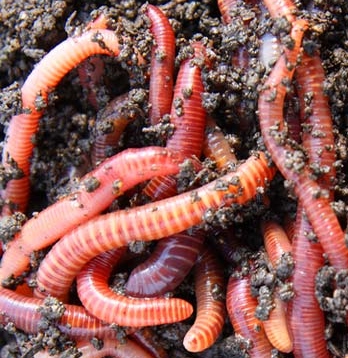Red Wiggler Worms Demystified: Opening the Secrets of Vermiculture for Greener Living and Nutrient-Rich Dirt
In the world of sustainable methods for improving dirt top quality and advertising eco-conscious living, red wiggler worms play a critical yet often neglected function. Red Wiggler Worms. Comprehending the complexities of caring for these worms, optimizing their environment, and harnessing their castings can lead to a greener lifestyle and much healthier dirt for plants to flourish.
The Role of Red Wiggler Worms
Red Wiggler worms play a crucial role in composting systems by efficiently damaging down natural matter into nutrient-rich castings. These voracious eaters eat a range of organic products, such as cooking area scraps, lawn waste, and paper products. As they feed, the worms' digestive procedures damage down the raw material right into a fine, dark, and nutrient-dense material referred to as worm spreadings or vermicompost.
The castings generated by Red Wiggler worms are extremely useful for soil wellness and plant growth. They are abundant in essential nutrients like potassium, phosphorus, and nitrogen, which are crucial for supporting healthy and balanced plant advancement. In addition, worm castings contain beneficial microorganisms and enzymes that aid enhance dirt structure, boost water retention, and enhance nutrient uptake by plants.
Advantages of Vermicomposting

It enhances dirt structure, boosts dirt oygenation, and boosts soil wetness retention. Vermicompost also enhances the dirt with necessary nutrients like potassium, phosphorus, and nitrogen, advertising plant development and overall soil fertility.
In addition, vermicomposting supports lasting gardening techniques by providing a chemical-free and all-natural choice to artificial fertilizers. Red Wiggler Worms. This eco-friendly strategy not just improves the dirt however also helps lower reliance on dangerous chemicals, advertising a greener and more sustainable means of gardening
Setting Up a Worm Bin
When developing a worm container for vermicomposting, correct setup is critical to guarantee the success of the composting process. The initial step in establishing up a worm bin is picking a suitable container. This can be a plastic bin or wood box that supplies adequate room for the worms to move and has proper drain holes to stop waterlogging. Next off, a bedding material such as shredded newspaper, cardboard, or coconut coir must be added to the container. This bedding provides a comfortable setting for the worms and aids maintain moisture levels.
After including the bed linens, introduce the red wiggler worms to the bin. It is advised to start with a little number of worms and gradually raise as they multiply. The worms must then be offered with food scraps such as fruit and vegetable peels, coffee premises, and eggshells. It is important to prevent adding meat, milk, oily, or salted foods to avoid drawing in bugs and creating undesirable odors.
Routinely keep an eye on the wetness levels and temperature level in the worm bin to make sure optimum conditions for view publisher site the worms. With appropriate arrangement and upkeep, the worm container will efficiently convert natural waste into nutrient-rich garden compost for your plants and yard.
Harvesting Worm Castings
To effectively accumulate nutrient-rich worm spreadings from your vermicomposting system, an organized harvesting method is important. When it comes time to gather the worm spreadings, there are a couple of vital actions to comply with to make sure a successful procedure.

Troubleshooting Common Issues
Recognizing and resolving common obstacles that may emerge during the vermicomposting process is essential for maintaining a productive and healthy worm bin. Adding excess food find here scraps can lead to an accumulation of moisture and level of acidity in the worm container, potentially hurting the worms. One more problem is unpleasant odors rising from the worm bin.
Additionally, if the worm population is declining or the worms appear unhealthy, it can be due to environmental stress factors such as extreme temperatures or pH degrees. Keeping track of these variables and making essential changes is important for the wellness of the worms. By troubleshooting these common problems immediately, vermicomposters can make sure a smooth and effective vermicomposting process while keeping a thriving worm population.

Verdict
Finally, red wiggler worms play a crucial function in vermiculture by damaging down natural matter into nutrient-rich dirt. The advantages of vermiculture consist of greener living and improved dirt top quality. Establishing a worm container is vital for effective vermiculture, and harvesting worm castings supplies beneficial compost for horticulture. By recognizing and fixing common concerns, people can open the keys of vermiculture for lasting living and healthier dirt.
As they feed, the worms' digestion processes break down the natural issue into a penalty, dark, and nutrient-dense product recognized as worm castings or vermicompost.
The castings produced by Red Wiggler worms are extremely helpful for soil health and plant development. Adding excess food scraps can lead to read what he said an accumulation of dampness and level of acidity in the worm bin, potentially harming the worms.In addition, if the worm populace is decreasing or the worms show up harmful, it could be due to ecological stressors such as severe temperatures or pH levels. Establishing up a worm container is necessary for effective vermiculture, and collecting worm spreadings provides important compost for horticulture.